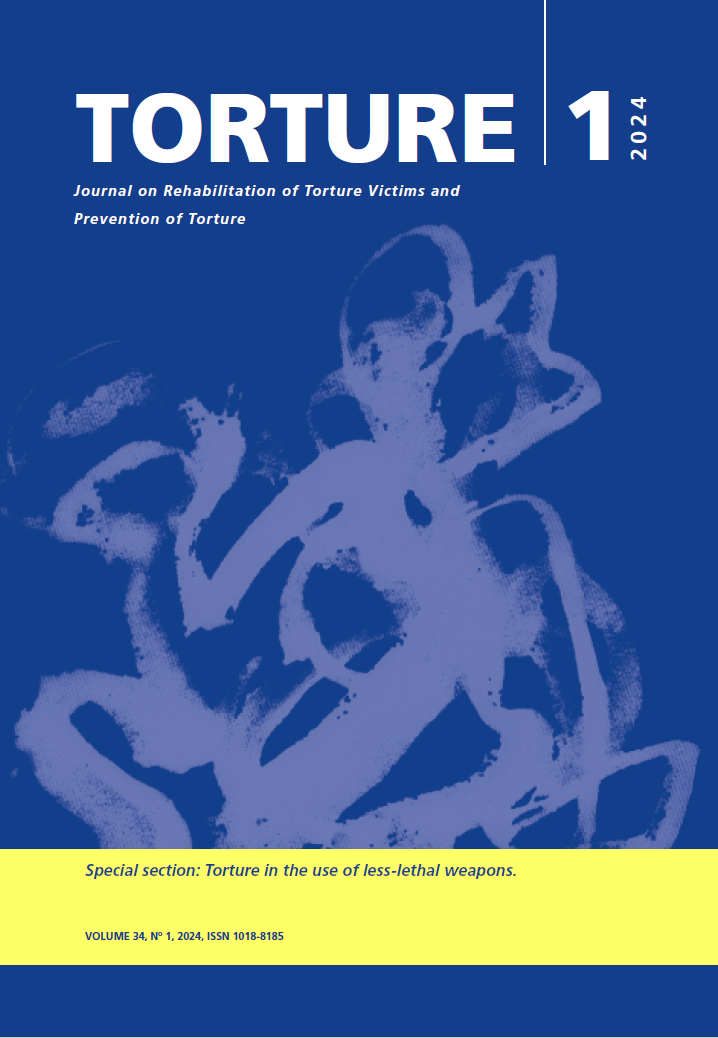Trade in torture tools threatens detainees and protestors everywhere – it must be banned
DOI:
https://doi.org/10.7146/torture.v34i1.144049Palabras clave:
torture trade, international regulation, civil unrest, policing assembliesResumen
With social upheaval, economic strain, and political unrest growing, peaceful demonstrations worldwide are increasingly met with brutal tactics by law enforcement and security forces. The UN Special Rapporteur on Torture outlines her call for States to negotiate a new international treaty to ban the manufacture, use and trade in “torture tools” and regulate the trade in law enforcement equipment. Her proposal outlines two critical components: a Prohibited list of items that she has deemed to be inherently cruel, inhuman or degrading, and a second Controlled list of ordinary law enforcement equipment that has a high risk of misuse. Effective international regulation is imperative to curb the indiscriminate use of force by law enforcement and to uphold human dignity. Improved national regulation is also required. Her research has revealed a pervasive market for these items, with more than 335 companies in 54 countries manufacturing or promoting the most egregious torture instruments. Major producers include China, the EU, and the USA, with emerging economies also contributing significantly. The outsourcing of public functions to private security companies further exacerbates the issue, underscoring the pressing need for robust national and international regulations.
Citas
Amnesty International, Omega Research Foundation (2020), Ending the Torture Trade: the path to global controls on the ‘Tools of Torture’, Amnesty International, https://www.amnesty.org/en/documents/act30/3363/2020/en/
Amnesty International, Omega Research Foundation (2023), “My eye exploded”: the global abuse of kinetic impact projectiles, Amnesty International, https://www.amnesty.org/en/documents/act30/6384/2023/en/
Carnegie Endowment (2024). Protest Tracker, Carnegie Endowment for International Peace, https://carnegieendowment.org/publications/interactive/protest-tracker
Edwards, A. J., United Nations Special Rapporteur on Torture (2023). Thematic study on the global trade in weapons, equipment and devices used by law enforcement and other public authorities that are capable of inflicting torture and other cruel, inhuman or degrading treatment or punishment. United Nations General Assembly, UN doc. A/78/324. https://undocs.org/Home/Mobile?FinalSymbol=A%2F78%2F324&Language=E&DeviceType=Desktop&LangRequested=False
Lethal in Disguise (2023a), Case Study: Belarus, Lethal in Disguise, https://lethalindisguise.org/case-studies/belarus/
Lethal in Disguise (2023b), Case Study: France, Lethal in Disguise, https://lethalindisguise.org/case-studies/france/
Research and Markets (2023), Global Police and Law Enforcement Equipment Market (2023 –2028)
United Nations Human Rights Council (2021), Resolution 46/15: Torture and other cruel, inhuman or degrading treatment or punishment: the roles and responsibilities of police and other law enforcement officials. United Nations General Assembly, https://documents.un.org/doc/undoc/gen/g21/078/07/pdf/g2107807.pdf?token=yWOJrSomnZ2cyaYmmL&fe=true

Descargas
Publicado
Cómo citar
Número
Sección
Licencia
Derechos de autor 2024 Torture Journal

Esta obra está bajo una licencia internacional Creative Commons Atribución-NoComercial-SinDerivadas 4.0.
We accept that some authors (e.g. government employees in some countries) are unable to transfer copyright. The Creative Commons Licence Attribution-NonCommercial-NoDerivatives 4.0 International (CC BY-NC-ND 4.0) covers both the Torture Journal and the IRCT web site. The publisher will not put any limitation on the personal freedom of the author to use material contained in the paper in other works which may be published, provided that acknowledgement is made to the original place of publication.

